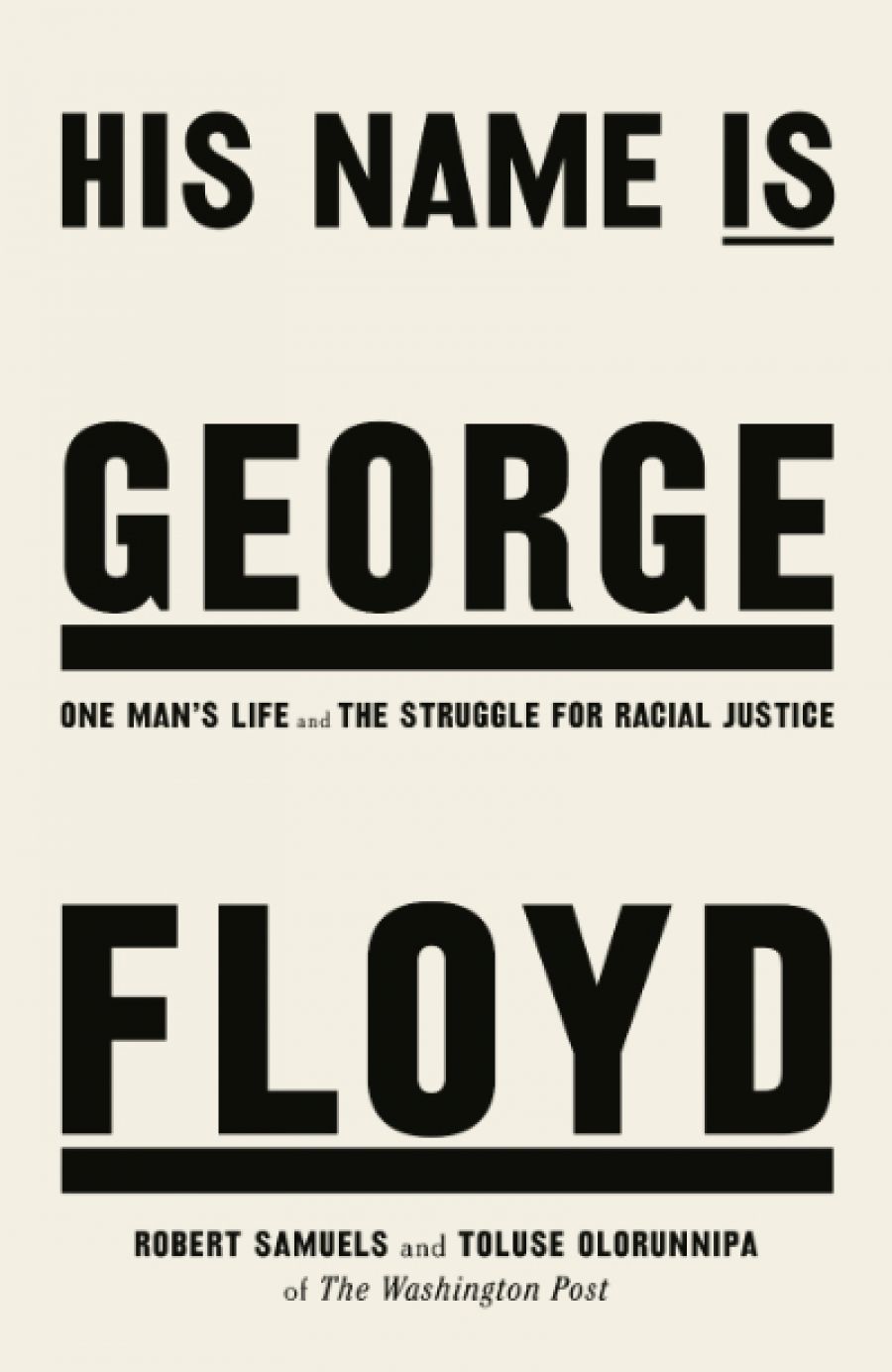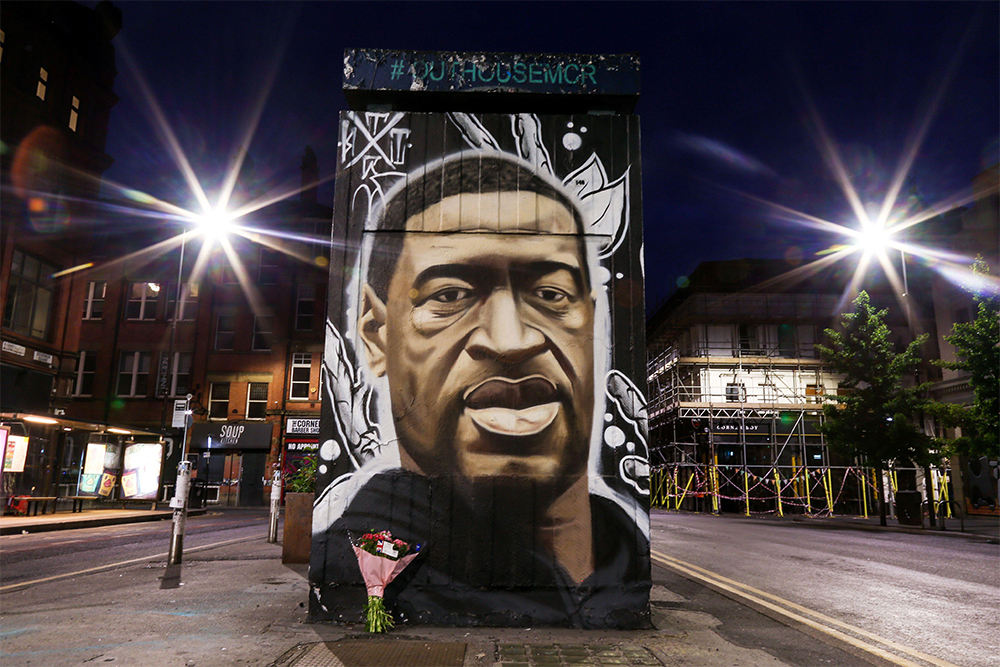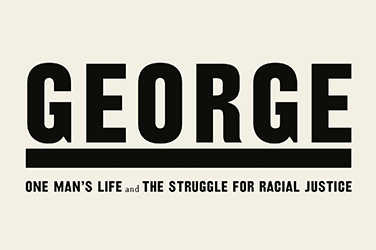
- Free Article: No
- Contents Category: Biography
- Review Article: Yes
- Article Title: Killing in the name
- Article Subtitle: A familiar story
- Online Only: No
- Custom Highlight Text:
I have no intention of reviewing this book. What is there to review? The story it tells is one we are told every day. It does not need telling. You know it already – a story that is not a story at all.
- Article Hero Image (920px wide):

- Article Hero Image Caption: George Floyd mural in Manchester, 2020 (Sam Pollitt/Alamy)
- Alt Tag (Article Hero Image): George Floyd mural in Manchester, 2020 (Sam Pollitt/Alamy)
- Featured Image (400px * 250px):

- Alt Tag (Featured Image): Declan Fry reviews 'His Name Is George Floyd' by Robert Samuels and Toluse Olorunnipa
- Book 1 Title: His Name Is George Floyd
- Book 1 Biblio: Bantam Press, $35 pb, 432 pp
- Book 1 Readings Link: booktopia.kh4ffx.net/kjr4ML
Sharecropping was ripe for abuse, and many Black families were stuck in an economic sand trap that left them hardly better off than their enslaved ancestors. At the end of harvest season, White landowners often told their tenants that, after tallying up the expenses and the crops, they had come out even – or, worse, that they were further in debt.
America is always trying to tell a story it has already decided upon, after the pilgrims left Plymouth, after the word New began to be appended to the world, and to those parts of it that were never ‘Old’ nor ‘New’ but sovereign, standing in another timeline – then stolen, then erased, just as the pilgrims erased their own histories and belongings to set sail – the part that was left out as slave ships sailed, carrying Black cargo as if it was any ordinary thing.
sailing ships freighted with human
CARGO, ships sailing halfway across the globe
humans held captive inside
– another theft –
Floyd never stole anything and, born in 1973, grew up listening to Public Enemy and how, in a Malcolm X speech excerpted in the intro to their song ‘Can’t Truss It’, we are told ‘It seems inconceivable,’ and that it seems inconceivable because ‘There are more records of slave ships than one would dream’ – until you reflect that for two hundred years ships carried cargoes of slaves. But George Floyd did not need the reminder. For him it was both and neither. Inconceivable, and also irrelevant: that timeline was over. The ship had sailed.
Born enslaved in 1857, George Floyd’s great-great-grandfather Hillery Thomas Stewart spent his childhood working without pay in the sizzling fields of Harnett County, North Carolina. But by the end of the nineteenth century, after more than thirty years working as a free man, he had managed to amass five hundred acres of his own farmland.
Over the course of Hillery Thomas Stewart’s lifetime, North Carolina legislators sought to prove that a free Black man, having ownership of their labour, could never achieve self-sufficiency in the American South. Laws were enacted to strip Thomas Stewart of his land and his possessions. He died penniless. Nothing personal. Just structural. City leaders in Wilmington were selected from the ranks of white supremacists, and laws were enacted to protect poor whites who could not read, a ‘grandfather clause’ for those whose lineal ancestors were eligible to vote as of 1 January 1867, the year Congress legalised suffrage for Black America.
In 1901, George Henry White, the sole Black member of the House, spoke of a phoenix-like return for his people. It would be seventy-two years – 1973 – before a Black person from the South would again serve.
‘I used to think it was nice in Minnesota,’ Philonise said. ‘But they’re killing Blacks.’
I used to think it was nice in Minnesota, but then George Floyd’s brother Philonise said what some of us struggle to say. I used to think it was nice in Minnesota, but then George Floyd’s daughter Gianna said what none of us want to say – although never as much as Black America does not want to feel it: ‘Daddy had trouble breathing.’
George Floyd suffered from claustrophobia throughout his life; Gianna’s mother told her daughter her father had died because of breathing difficulties. The benign complications of inhabiting a body.
Philonise had trouble breathing, not only in the courtroom where a prosecutor instructs you, ‘Dear Honorable Member of the Jury, try touching your Adam’s apple’ – and then you place your hand above your Adam’s apple – the part of the neck where Derek Chauvin placed his knee, far more vulnerable than the rest of the organ – and for a moment you realise: the truer story takes into account what the simpler one does not.
Because one story takes into account the life, not just the murder. Because in White America, ‘Daddy had trouble breathing’.
Genevieve Hansen, the EMT who urged officers to check Floyd’s pulse, told prosecutors she would be unwilling to watch the video of him dying. When they insisted and played it for her one day, Hansen plugged her ears with her fingers and closed her eyes and started to scream.
Like many, to this day I still have not seen the full video of Floyd’s murder. I refuse. I am Donald Hooker Jr, activist and chess coach, staring at Floyd’s neck ‘cranked under the weight of Derek Chauvin’s knee’ before bursting into tears. ‘He stopped watching’, we are told, ‘after forty seconds.’
And if I hold up my hand and say It is my hand and you say It is my hand and then you see that it is my hand, know it is my hand, you will say: that is my hand. My neck is your neck.
You can take it.
‘This, Mr. Chairman, is perhaps the Negroes’ temporary farewell to the American Congress,’ White declared on January 29, 1901, a few weeks before he left office. ‘But let me say, phoenixlike he will rise up someday and come again.’
I began reading His Name Is George Floyd at its final chapter. It is the one I keep returning to – not because I wish to, but because it is the one that keeps happening. The chapter is called: ‘American Hope’. The ending, the finality, and then the promise. Messianism with – or without – recourse to the messianic.
As I read the last chapter, I thought But it’s all over anyway. And then I thought: But because it is all over we can still make space. For what has ended. We can honour conclusions. And also: But because it is all over we allow it to keep on happening. Not because we are Americans – we aren’t – here, it’s First Nations we kill, in ways both similar and different from the settler colonialism of Turtle Island – but because we live with too many foregone conclusions and because, for some of us, life seems to be already foregone anyway.
I had no intention of reviewing this book. What was there to review? The story it told is one we were told every day. It was a story that did not need telling.
You know it already. It is a story that is not a story at all. If you want to see it, put down this review – this review that is not a review – and not a refusal, either, by the way, just an admission – go, and look out of the window. It is all there.
Now begin.


Comments powered by CComment